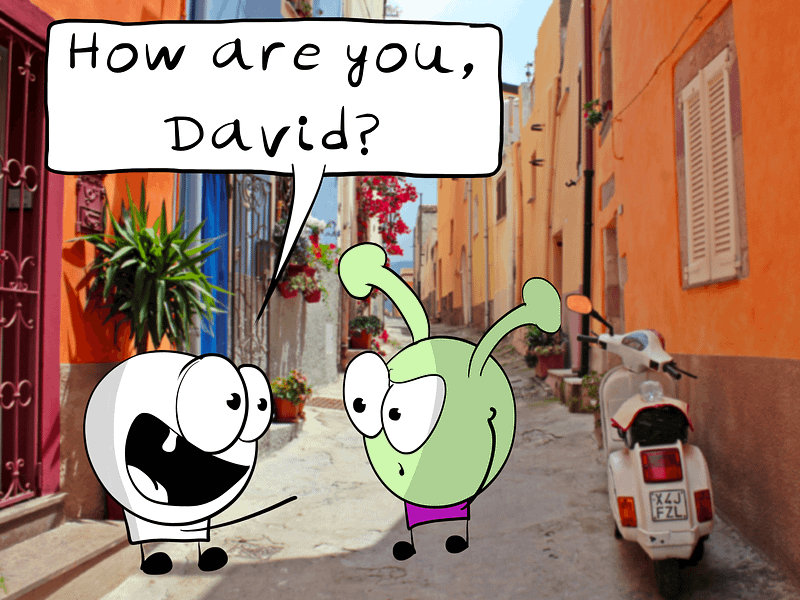Understanding Prosopagnosia: A Personal Journey Through Recognition
Written on
Chapter 1: My Encounter with Prosopagnosia
When I first learned about prosopagnosia, a peculiar neurological condition, I was certain it applied to me. Having spent the majority of my life in a quaint Spanish town of around 14,000 residents nestled in a valley by the Mediterranean, famous for its unique oranges, I’ve called this place home since I was twelve. My formative years unfolded here: I attended school, experienced my first drinks, navigated young adulthood, met my wife, and now, I find myself writing these reflections.
In a small town steeped in history, traversing the streets is simple, so I don’t drive; I walk everywhere. However, an odd pattern keeps emerging in my daily life.
As I stroll, lost in thoughts like “If the meat from stressed animals is unpalatable, humans must taste even worse,” I’m often jolted back to reality by someone calling out, “Hey, David! How’s it going?” Suddenly, I’m faced with a cheerful individual, clearly expecting a chat.
The usual exchange unfolds:
Me: Oh, uh… Hi! I’m well!
My mind: Who is this person?
Stranger: It's been ages! How’s your mother? And your brother?
Me: Uh… they’re fine.
My mind: Seriously, who are you?
Stranger: So, what’s new with you? You finished your computer engineering degree, right?
Me: Uh… Yes.
My mind: How does he know that?
Stranger: By the way, Tony mentioned you have a new dog. It’s a German pointer, isn’t it?
Me: Yes.
My mind: Who is Tony?!
And the cycle continues.
This scenario has been a recurring theme in my life, long before I ever published anything online or even knew the Internet existed. I encounter people from my hometown who seem to know everything about me while I struggle to recognize them.
This often leads to my appearing standoffish, not reciprocating questions, which might make me seem aloof. In reality, I'm quite friendly; I just don’t know who the hell they are!
Chapter 2: The Search for Answers
When I came across the term prosopagnosia a few months ago, I felt a rush of revelation: This has to be the reason behind my social awkwardness! Prosopagnosia is often described as face blindness. According to the National Institute of Neurological Disorders and Stroke (NINDS), it is characterized by the inability to recognize faces and can be socially debilitating. Individuals with this condition often struggle to identify even close family members and friends.
However, I can recognize my mother, so I pondered whether I might simply have a milder form of this condition or perhaps identify her through other means, like scent. Regardless, I needed clarity, so I dedicated an afternoon to researching online.
Eventually, I stumbled upon a diagnostic test for face blindness. Intrigued, I clicked the start button, only to find myself staring at a bald, eyebrow-less image of Angelina Jolie, with a prompt asking if I recognized her. I chuckled, thinking, “Duh, that’s Angelina during chemotherapy.”
Next came another image, this time of Barack Obama, also hairless. My thoughts spiraled, “Oh no, Obama has cancer too?!” The test continued with more celebrities like Brad Pitt and Cameron Diaz, all sporting shiny, hairless heads.
Fortunately, it turned out that none of these stars were battling cancer; their images had merely been digitally altered to appear bald. The disappointing conclusion of the test was that I recognized all the faces, leading to the result: “You are not face blind.”
This left me puzzled. If I’m not face blind, why can’t I recognize people approaching me on the street?
Section 2.1: The Realization
Months later, I pieced it together. People in my hometown recognize me because I stand out. When I first arrived as a child, I was among the few foreigners attending the local school. With my blue eyes, peculiar eating habits, and a distinct accent that sounded like an exaggerated Arnold Schwarzenegger speaking Spanish, I was unforgettable. Meanwhile, the other children blended together in my mind, a sea of indistinct faces.
Now, as adults, I keep encountering those former classmates who remember me well, while I often view them as mere distant acquaintances. So, I’m not afflicted with prosopagnosia; rather, I’m just an unusual figure—an outsider who has left a lasting impression.

Chapter 3: Insights on Recognition
This video titled "What is Face Blindness?" offers a deeper look into the phenomenon of prosopagnosia, explaining its implications and effects on daily life.
In "How Face Blindness Works | STUFF YOU SHOULD KNOW," learn how this neurological condition functions and the science behind facial recognition.